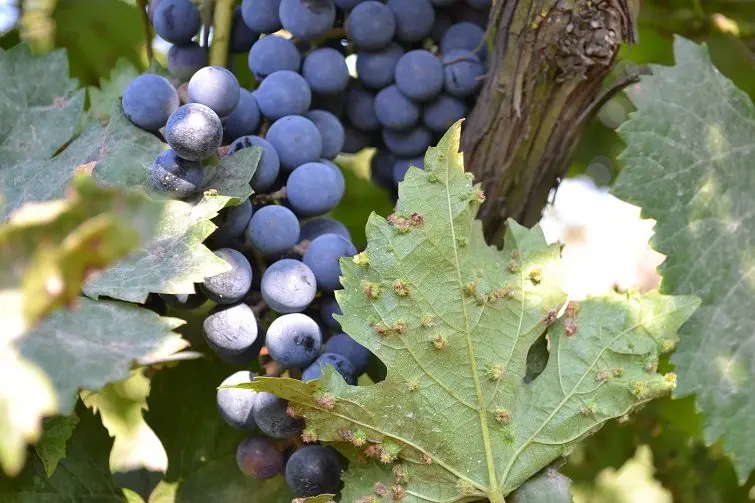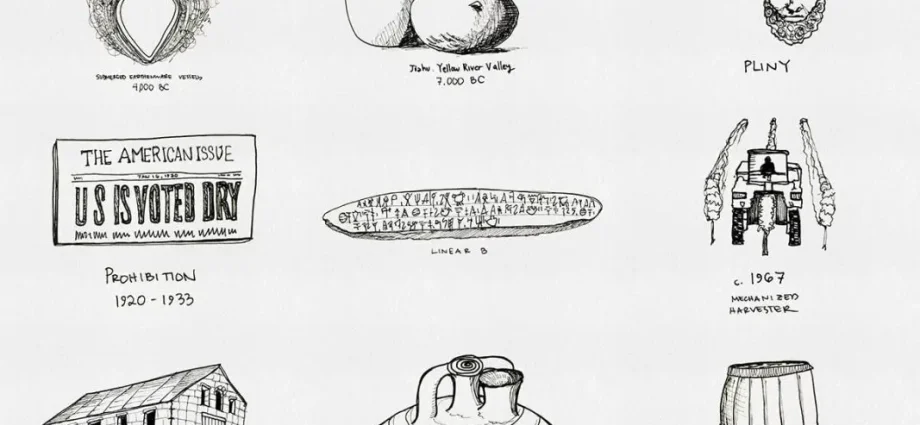Contents
No other drink in the world causes so much controversy and gossip. Almost every country claims that it is the birthplace of fermented grape juice, and those who do not claim the palm believe that only they know how to make “real” wine.
Archaeologists cannot give an unambiguous answer to the question “who, where and when invented wine?”. Obviously, already 8-10 thousand years ago people knew the cultivated Vitis Vinifera grape, ate its fruits and drank its juice. At least, shards of clay vessels with the remains of a wine drink have been preserved, and the first graphic and textual evidence of the existence of wine dates back to the 4th millennium BC.
Etymology of the name
According to one version, the modern word “wine” is related to the Georgian “ghvivill” – “bloom, ferment”. Vasmer (a well-known German linguist of Russian origin), however, traces common roots with the Slavic “vit”, and some researchers even argue that the term is based on the Sanskrit root “vena” – “beloved”. None of the hypotheses have evidence.
Legends about the origin of wine
An interesting fact: in any ancient religious system there is a myth about how wine appeared. The Greek legend is especially famous: ancient storytellers assure that the shepherd Estafilos should be blamed (or thanked?). He was looking for a sheep, and when he found a runaway, the animal was eating the leaves of some unfamiliar plant. The surprised young man collected the fruits of a strange tree and brought them to his master, who squeezed the juice out of them and got a refreshing drink. Everything else is a matter of technique: once grape juice was accidentally left in the sun, it fermented, and people learned that the resulting intoxicating drink amuses no worse than going to the ancient Greek theater, and heals almost like Hippocrates.

The Romans, Phoenicians, ancient Germans and other peoples attributed the honor of creating wine to their gods – it is not surprising that this drink was actively used during religious rituals and was considered a dish for the nobility. However, in the same Ancient Rome, wine was so widespread that it was even given to slaves – but, of course, these were not collectible aromatic wines, but a third-class drink. In Roman mythology, it is stated that Saturn, the god of the earth and crops, planted the first vine in the world.
A Persian legend is very touching and refined in an oriental way: in Asia Minor they believe that a certain king received grape seeds as a gift from a grateful bird, saved by him from a snake. The tree grew, gave fruit, the grape juice turned out to be sweet and fresh, and for a long time people drank it to quench their thirst. Once a sour drink was brought to the king, he got angry, ordered to remove the vessel away. Frightened servants took the unusable juice to the cellar, and they forgot it there.
Some time later, the king’s favorite concubine fell ill with a severe headache. The girl did not sleep for several nights, she suffered so much that she decided to die. She drank all the fermented juice, hoping that it turned into poison, but only slept for a few days and woke up completely healthy. So the wine became known to the Turkic peoples.
Wine and geography
In Egypt, the history of winemaking goes back to the era of the Old Kingdom (beginning of the XXVIII – the middle of the XXIII century BC) – bas-reliefs depicting grape pickers at work have been preserved, there is also written evidence.
In Greece, the history of wine began about 4000 years ago – this was facilitated by the mild warm climate of the country. By the way, Hellenic wine was very different from the modern one: it was a thick drink with herbs, nuts, and honey. Some recipes even prescribed adding ash, white clay or oil to the wine.
Rome obviously took over the Greek traditions, enriched them and successfully spread throughout the rest of the world in the course of victorious conquests. It was the Romans who learned to age wine in barrels (the literature of that time mentions hundred-year-old varieties, although this is unlikely) and established exports to other European countries.
Transcaucasia claims to be the “cradle” of winemaking – wine appeared in this region at least 4000 years ago, and the semantic analysis of the word “wine” itself does not exclude its Caucasian origin.
In France, the production of a fragrant heady drink began no later than the XNUMXth century BC, in Portugal – in the XNUMXnd century. BC, and in Germany – according to the most conservative estimates, at least in the XNUMXst century AD, or even earlier.
Wine in the Middle Ages
In the Middle Ages, two factors contributed to the spread of wine: the strengthening of Christianity and navigation.
The church not only encouraged the consumption of wine for ritual purposes in every possible way, but also produced it itself – monastic varieties are still highly valued. Thanks to the development of navigation, wine-producing countries were able to establish trade relations not only with their closest neighbors, but also with other continents. It is a common misconception that wine made its way to China and Japan on ships, but in fact, it existed there before, it just often ended up under a royal ban.

It was thanks to the developed export to England that drinks such as sherry and Madeira became popular: the British drank wine like water – literally, in the Middle Ages, no one had ever heard of tea, it was wine that was served at the table during any meal.
Alchemy contributed a lot to the development of wine – medieval scientists often managed to find not only new chemical compounds, but also original tastes.
The victorious procession of wine across Europe was nearly interrupted by the phylloxera epidemic that broke out at the end of the XNUMXth century. It was then that absinthe, beer and other types of alcohol entered the international arena. Fortunately, although with losses, this critical moment in the history of wine was overcome – European vines began to be crossed with North American varieties that have innate immunity to the pest.

Winemaking in Russia
Despite the fact that in some regions of modern Russia winemaking appeared many centuries ago (the territory of modern Dagestan, the lower reaches of the Don), in general, people in Russia preferred intoxicated honey, beer and mash. Industrial production of wine began only under Peter I – the progressive tsar spied on foreign technologies and introduced them in his country.
Today, Russia produces enough wine for domestic consumption and export, but the glory of the famous Moselle wines or French Bordeaux is still a long way off for the domestic product.










